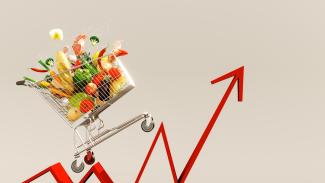
Market Watch: May 2022
So far 2022 has been a challenging year for investors, with almost no safe haven in sight. Stock markets globally have fallen close to the 20% threshold that constitutes a bear market. Bonds, normally the offset to stock market declines, fell broadly 10% in the same time frame. This is the first time that stocks and bonds have fallen in value together in any meaningful way in over 30 years. The terrible war in Ukraine has certainly been a factor here, as has the recent strict lockdown policy by the Chinese government, but the real bugbear behind market nervousness has been the sharp, and persistent, spike in inflation.
You don’t need to be a stock market investor to see, and feel, the impact of chronically high inflation. You know it by the involuntarily wince you make when you pull in at the pump to fill up or when you reach the checkout at the grocery store. While it’s likely true that at least some (if not a lot) of the current sky-high inflation is transitory, which has been the narrative of the Central Banks around the world, the global stock and bond markets are coming to terms that the Central Banks may have gotten the inflation response wrong, have let things run hot, and are now struggling to reign it in.
After 2 years of very accommodative Central Bank policies, such as keeping interest rates as low as possible and capitulating for the most part when market forces pressed back against rate hikes or other policies that would have stymied growth, we are now faced with a much more challenging environment. Investors are understandably anxious, grappling with decades-high levels of inflation, the impact of possible faster-and-further central bank tightening policies as well as high oil prices, ongoing supply chain bottlenecks and geopolitical tensions. Yet, it’s a tried and tested truism that markets “climb a wall of worry,” which means that market forces eventually digest all of the current concerns of the day (and there are always many!) and move higher in the medium term regardless. Focusing too much on short-termism, which the media conditions us to do, can lead to bad outcomes.
The Russia-Ukraine conflict is very concerning and continues to affect investor sentiment in the short-term. More interest rate hikes are coming to combat inflation, which will likely stay high in the near term, but should cool later in the year as the effects of the pandemic fade. After very strong stock market gains over the last three years, even through a global pandemic, it not surprising to see some less favourable returns. But the underlying economy remains strong, and many businesses should continue to do well even as the economy and markets adjust to higher inflation and interest rates.
At times like these it is important to keep animal spirits in check, just like the short-term manias experienced during the internet bubble of 2000, or any of the rags to riches to rags phenomenon’s such as cryptocurrency, meme stocks, or cannabis companies. FOMO (fear of missing out) can be just as dangerous, if not more, as selling quality investments in response to fear or a knee-jerk response to a short-term event. Warts and all, the stock market is the greatest wealth creation machine for individuals who want arms-length exposure to the profit potential of innovative, or even just necessary, companies who help us live our lives through their core products and services. But it’s not easy. It requires fortitude to endure these occasional difficult periods and keep focusing on the long term.
Regardless of where we are in the market cycle, it’s important to take a disciplined approach to investing and stay focused on your long-term financial goals. This strategy helps you keep your emotions out of investing, where you can end up buying high and selling low like many investors are prone to do when they act emotionally. While it has been a bumpy ride so far this year, the global economy and markets are capable of coping with just about anything, as we are in our own lives. Keep in mind that the market bottomed in later March 2020. Despite the media narrative at time, or understandable personal anxiety on the part of individual investors, the fund managers we spoke with were looking through the unprecedented global economic shutdown to a world that would eventually reopen once vaccines were globally available. This is exactly what happened.
Please remember that we are here to support you in achieving your financial goals and do not hesitate to contact us at any time.

